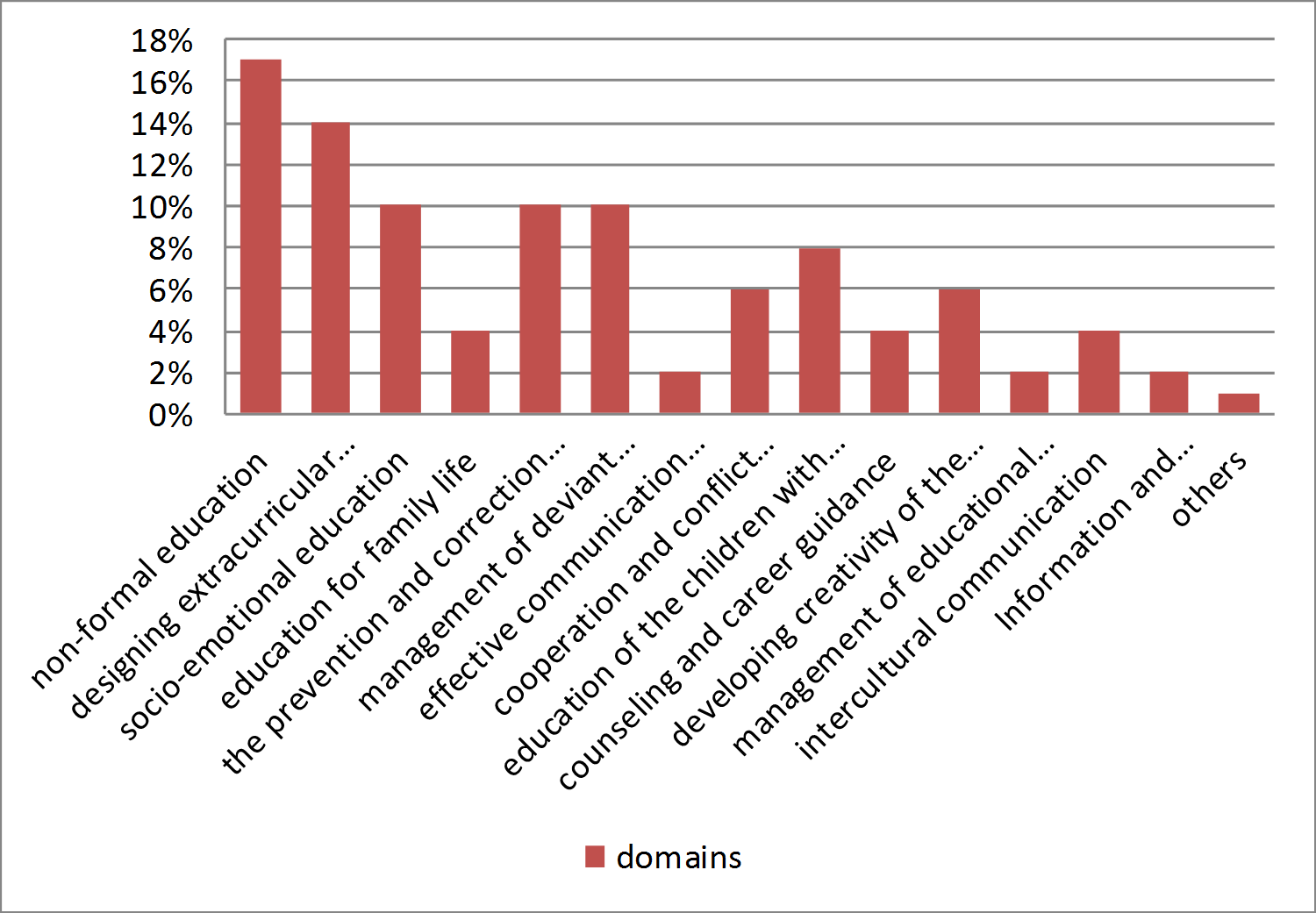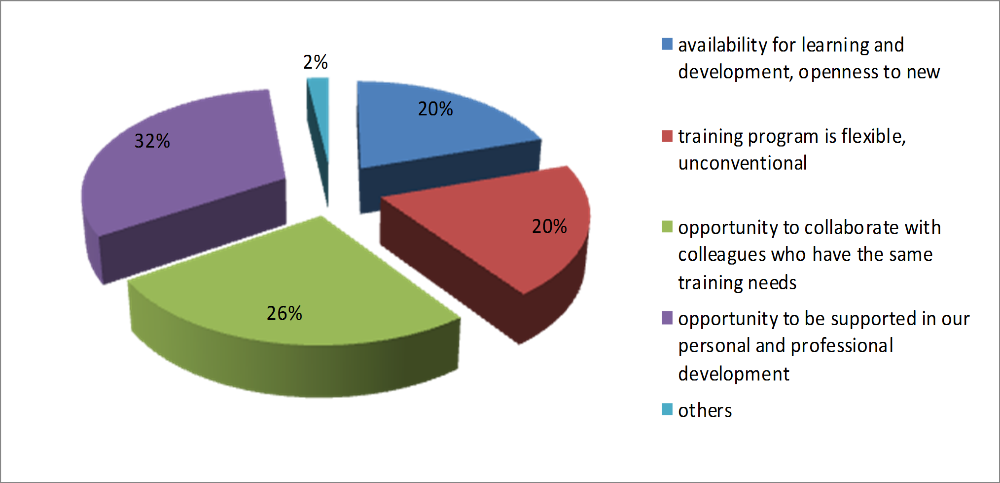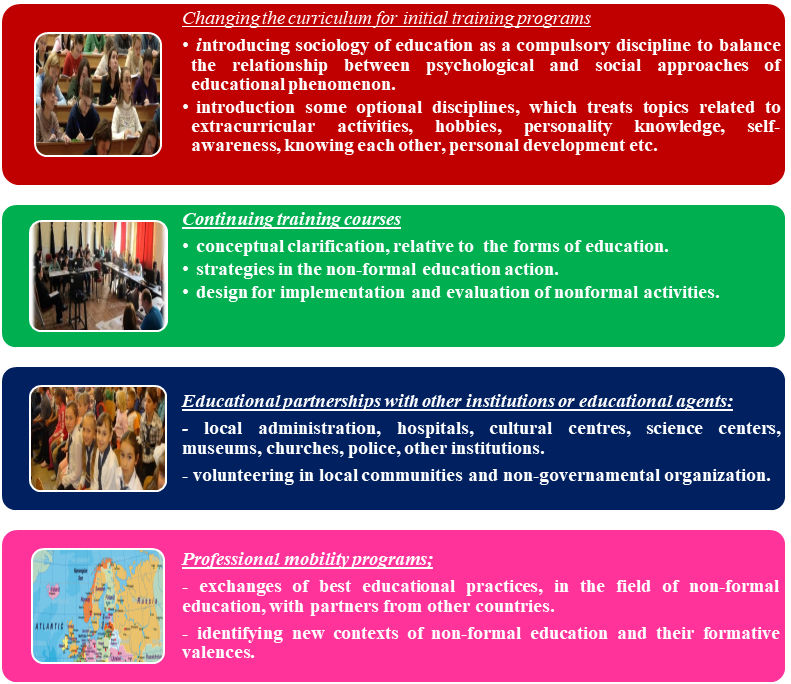Abstract
Starting with the premise which considers that in the curriculum dedicated for the pre-service teacher training there are not included finalities and specific contents for their professional development concerning non-formal education, a series of educational actors have designed and implemented activities organized in non-formal environments. As UNESCO defined the non-formal education as a process of learning “
Keywords: Forms of educationteachers’ professional developmentnon-formal educationteachers’ skillsIRRESISTIBLE project"
Introduction
The forms of education represent modalities of personality training and development activity, through actions and / or pedagogical influences, carried out in the system of education / training in exercising the general functions of education (function of training and personality development, economic function, civic function, cultural function).
The classification of the educational forms can be achieved on the basis of two criteria: the presence or absence of the intention and the presence or absence of organization.
Combining the two criteria, we can identify two categories of forms:
a) formal and non-formal education - intentional and organized forms of education based on pedagogical actions (which do not exclude the possibility of some pedagogical influences);
b) informal education - unintentional and unorganized form (spontaneous) made only on the basis of pedagogical influences (Cristea, 2000).
The formal education is the set of actions designed in accordance with pedagogical intentions (purposes), organized in the education system. It contains actions organized systematically by level of education (primary, secondary, higher) on the school steps, learning cycles, years, semesters etc. in a learning process conducted with the utmost rigor (based on curricula, textbooks, courses, learning materials, specialized teachers, regular assessments etc.).
The non-formal education complements formal education in an institutional framework outside the education system but also inside it (clubs, camps, educational television), constituting “a bridge between the knowledge acquired in lessons and information gathered informally” (Văideanu, 1988).
The informal education includes all educational influences exerted spontaneously on personality, from family level, social environment (cultural, political, economic, religious etc.), (micro) social groups, community (local, regional, national) and mass-media.
Due to the fact that in this paper we chose to approached especially non-formal education, in terms of teachers’ skills for designing and implementing educational activities of this type, we consider necessary to identify the fundamental characteristics to this form of education, which are:
a) unofficial pedagogical design, with programs open to interdisciplinary studies and continuing education;
b) optional and unformalized organization, determined by the choices of students and school or local communities, with special openings for experiment and innovation;
c) evaluation seen as voluntary and unofficial matter, with stimulating role, without notes or official marks;
d) valorisation of more pronounced “
The limits of non-formal education appear in the conditions of some programs that do not have an adequate degree of organization, are too flexible and open; under the conditions in which the final assessment is not carried out by notes, non-formal education does not provide certification and validation of results that otherwise may be comparable to those achieved in the formal education system (Cristea, 2008).
Problem Statement
In Romania, the teacher training process involves two dimensions: the initial and continuing training. The initial training is usually done during the undergraduate studies, based on a national curriculum. In this context, there are formed a series of professional and transverse skills/competences:
Professional competences:
designing didactic activity,
conducting and monitoring the learning process,
assessing education activities,
using digital technologies,
knowing, counselling and treating students in different manners,
class management.
Transversal competences:
institutional development of school and of school-community partnership,
career management and personal development,
applied educational research.
Starting from the initial psycho-pedagogical training, provided through or in parallel with undergraduate studies, throughout their careers, teachers must be concerned with training and professional development.
In accordance with the Methodology on training the staff in pre-university education in Romania, this activity is done primarily by (Ordin no. 5561/2011; Ordin no 5387/2016):
a) programs and activities to improve scientific, pedagogical and didactic training;
b) training programs in the areas of leadership, mentoring and evaluation of education;
c) training and exams for obtaining teaching degrees I and II;
d) professional conversion programs;
e) specialization studies in another license area.
In this context, non-formal education gets a special importance. Thus, the problem of interest that we intend to investigate in this paper is oriented on the teacher’s training related to non-formal education settings, and in particular, on the ways of empowering teachers with necessary skills for designing non-formal educational activities.
Research Questions
In the respect of the items mentioned above, three questions come in-line with our purpose research:
(a) Is non-formal education really an interested topic for our teachers?
(b) What are the main benefits of the teachers’ involvement in continuous training, achieved through non-formal education specific strategies?
(c) Can we identify contexts in which the teachers may develop their professional skills, related to non-formal educational dimension and, for each context, can we identify possible ways of developing teaching professional skills in non-formal education settings?
Purpose of the Study
This paper highlights some aspects on how to develop the skills of the teachers related to non-formal education. In this sense, a study was conducted on a sample of Romanian teachers, who were part of the
The project entitled IRRESISTIBLE - Including Responsible Research and Innovation in Cutting Edge Science and Inquiry-based Science Education to Improve Teacher's Ability of Bridging Learning Environments
The project partners collaborated in an attempt to make the students and young people aware of the specific problems of
IBSE methodology (Inquiry-based Science Education);
6E model (Engage, Explore, Explain, Elaborate, Exchange, Evaluate);
RRI dimensions (Responsible Research and Inovation).
The non-formal units are oriented on: Applications of nanomaterials in medicine, Applications of nanomaterials in solar energy systems, Industrial applications of nanomaterials, Applications of nanomaterials in museum research. All those activities were carried out in the context of the educational program: “School, in another way - To know more, to be better!”. All activities recorded a great success among students, but also teachers.
Research Methods
As research methods, a survey questionnaire was used, being administrated to 50 teachers from secondary education. The items were designed in some different categories like: forms of continuous teachers training, participation in some teachers training courses related to non-formal education, areas in which the teachers are interested in the process of continuous training, benefits of continuous training achieved through non-formal education specific strategies, identification of some contexts in which the teachers can develop their professional skills related to non-formal educational dimension, and for each context, possible ways of developing teaching professional skills in non-formal education.
The data obtained from the questionnaires were completed with the data obtained from the focus-groups dedicated to investigate non-formal educational activities potential.
The processing of the results was mostly statistical, in correlation with the qualitative analysis, based on the data gathered from the focus-group discussions with the involved teachers.
Findings
In this section, we analyse and comment three of the items included in the questionnaire and in the focus-group discussions.
The first item referred to the areas in which teachers are interested for undertaking professional continuous training courses. Non-formal education was introduced mainly taking into account that formal education reacts too slowly to the changes recorded in the actual world.

The responses (illustrated in figure
The second item referred to the benefits of continuous training achieved through non-formal education specific strategies.

As can be observed in figure
For the third analyzed item, the teachers have identified four educational contexts in which they can develop their professional skills related to non-formal educational dimension / training programmes, continuing training courses, educational partnerships and professional mobility programmes. In addition, for each context, the teachers have identified several strategies or ways of action, presented synthetically in figure

Conclusion
The results of the research led to the following conclusions, considering the responses to the research questions:
non-formal education represents an area in which teachers are very interested for developing their professional skills, and the benefits of the teachers’ involvement in related professional continuous training programs are more than important for their career;
the teachers who participated in our study (even they are questioned or interviewed during the focus groups) identified four important contexts and specific ways/strategies in which they can develop their professional skills, related to non-formal educational dimension: changing the curriculum for the initial training programmes, continuing training courses, educational partnerships with other institutions or educational agents, professional mobility programmes.
The professional continuous training of the teachers in non-formal education settings represents a topical issue which must stand in the attention of those who develop and implement the educational policies.
We appreciate that in Romania there have been made a number of important steps in the direction of non-formal education and on valorising ways of interaction with the other two forms. The IRRESISTIBLE project represents a very good example on sustaining this fact.
However, we believe that, especially in the direction of equipping teachers with the necessary skills for the design and development of non-formal education activities, there must be made several changes in the curriculum for initial and continuous training for the teaching career.
Acknowledgments
This work was funded through the Seventh Framework Programme Project “IRRESISTIBLE - Including Responsible Research and Innovation in Cutting Edge Science and Inquiry-based Science Education to Improve Teacher's Ability of Bridging Learning Environments” - a coordination and support action under FP7-SCIENCE-IN-SOCIETY-2013-1, ACTIVITY 5.2.2 “Young people and science” - Topic SiS.2013.2.2.1-1: Raising youth awareness to Responsible Research and Innovation through Inquiry Based Science Education.
This project has received funding from the European Union’s Seventh Framework Programme for research, technological development and demonstration, under grant agreement no 612367. The support offered by the European Commission, through the project mentioned above, is gratefully acknowledged.
References
- Cristea, S. (2000). Dicţionar de pedagogie. Bucureşti: Litera Internațional Publishing House.
- Cristea G. (2008). Pedagogie Generală, Ediția a II-a. București: Editura Didactică și Pedagogică R.A Publishing House.
- Văideanu, G. (1988). Educaţia la frontiera dintre milenii. Bucureşti: Editura Politică Publishing House.
- Ordin no. 5561/2011 pentru aprobarea Metodologie privind formarea continuă a personalului din învățământul preuniversitar. Retrieved from https://www.edu.ro.
- Ordin no. 5387/2016 privind modificarea şi completarea Metodologiei de acreditare şi evaluare periodică a furnizorilor de formare continuă şi a programelor de formare oferite de aceştia, aprobată prin Ordinul ministrului educaţiei, cercetării, tineretului şi sportului nr. 5.564/2011 Retrieved from https://www.edu.ro
Copyright information

This work is licensed under a Creative Commons Attribution-NonCommercial-NoDerivatives 4.0 International License.
About this article
Publication Date
30 July 2017
Article Doi
eBook ISBN
978-1-80296-026-6
Publisher
Future Academy
Volume
27
Print ISBN (optional)
-
Edition Number
1st Edition
Pages
1-893
Subjects
Teacher training, teaching, teaching skills, teaching techniques,moral purpose of education, social purpose of education, counselling psychology
Cite this article as:
Petrescu, A. M. A., Cristea, G. C., & Stăncescu, I. (2017). Empowering Teachers With Necessary Skills For Designing Non-Formal Educational Activities. In A. Sandu, T. Ciulei, & A. Frunza (Eds.), Multidimensional Education and Professional Development: Ethical Values, vol 27. European Proceedings of Social and Behavioural Sciences (pp. 609-616). Future Academy. https://doi.org/10.15405/epsbs.2017.07.03.71

